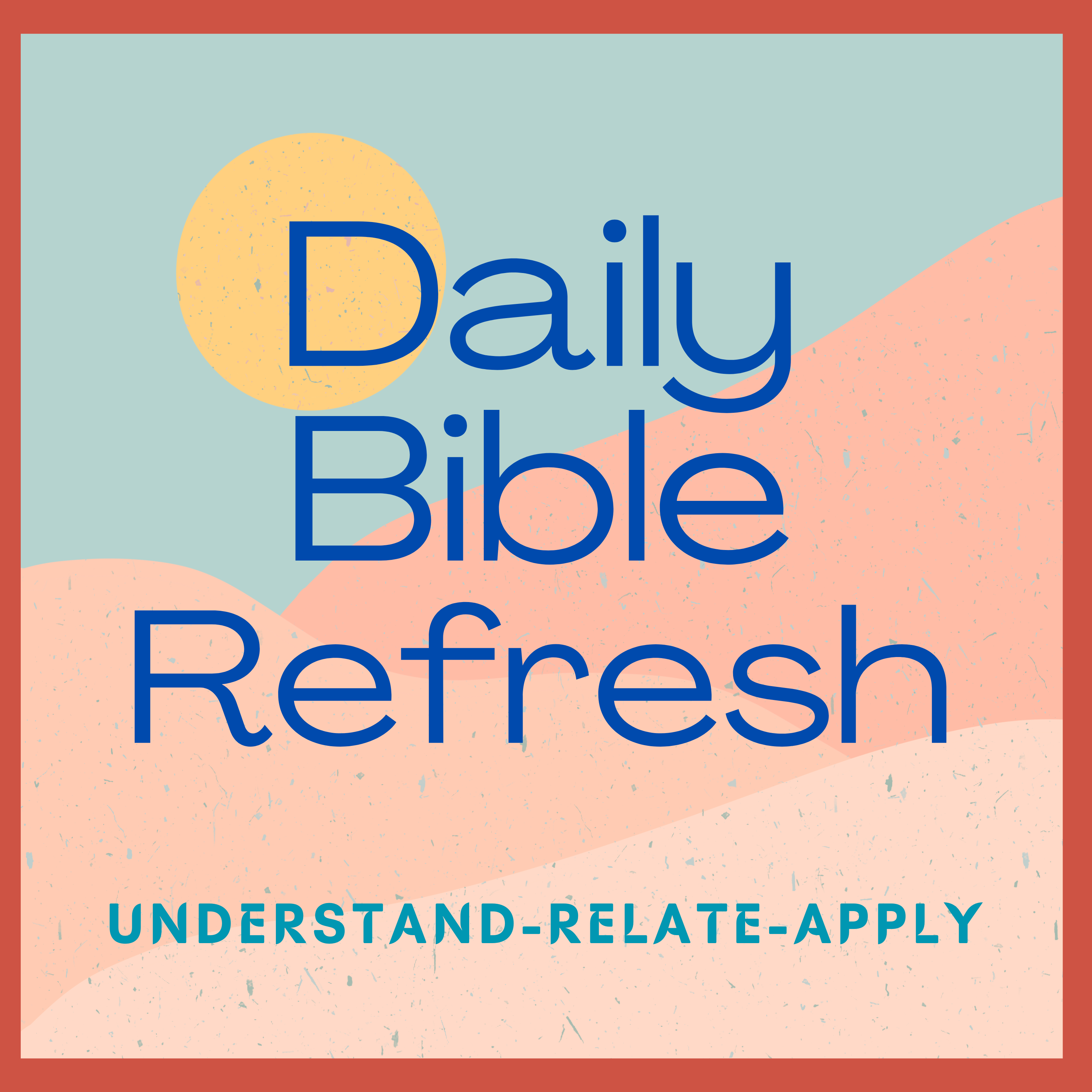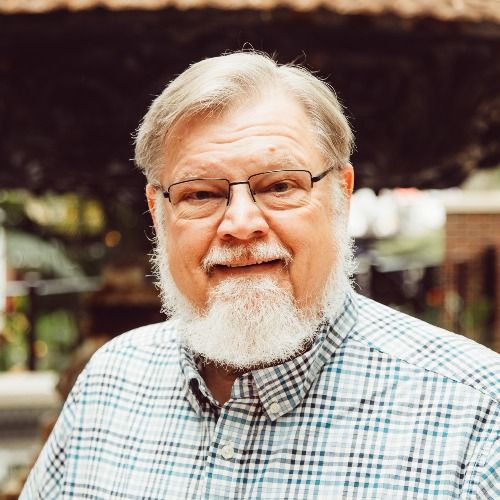Episode 930
Beyond Light and Dark: Understanding Love's Revolutionary Nature
The "Daily Bible Refresh" is presented each day by Rev. Dr. Brad Miller who has a goal of speaking a bit of the bible into two million ears (one million people) in three years (2025-2028).
He is the author of "The A, B, C-1,2,3 Bible Study Guide" Free to you by clicking HERE.
Brad served as a local church pastor for forty years and has a background in radio and podcasting. Moreover, he is a life-long student of The Bible.
He believes in the words of Jesus that “scripture is fulfilled in your hearing” (Luke 4:21)
The "Daily Bible Refresh" is available seven days a week by 6:00 am ET. The episodes are no longer than ten minutes long and are...
- Understandable: A reading from the New Testament (usually the Gospel) selected from the Revised Common Lectionary using "The Message" translation.
- Relatable: You will have a couple of "points to ponder" from the text which will relate to your life
- Applicable: Every episode includes a way you can take action based on the reading
- A recommended resource to help you go deeper in biblical study and spiritual direction.
- A prayer for your day.
A companion resource to the Voice of God Daily Podcast is the “ABC Bible Study Guide” available by clicking HERE.
The "Daily Bible Refresh" is available every day at VoiceofGodDaily.com on Apple Podcasts, Spotify and all major podcast directories.
You can help Dr. Brad attain his goal of getting a bit of the bible into two million ears by subscribing to "Daily Bible Refresh" on Apple Podcasts, leaving a five-star rating, and writing a review. More importantly please share with your network of family and friends about the "Daily Bible Refresh".
Please make listening to the "Daily Bible Refresh" a part of your daily life.
Remember… “All scripture is God-breathed and useful”(2 Timothy 3:16)
The exploration of First John 2:7-11 unveils a profound understanding of the interrelation between divine illumination and human connections. The passage, often regarded as an ancient commandment, is presented not merely as a reiteration of previously understood concepts, but rather as an invitation to perceive love as a transformative force within our interactions. The notion of love transcends mere sentimentality; it emerges as a revolutionary practice that compels us to engage in active solidarity and mutual care, urging a departure from mere tolerance to a deeper commitment to social justice. This reading challenges us to recognize that our capacity to embody God's light is intrinsically linked to our treatment of others, suggesting that true enlightenment cannot exist in isolation from the collective experience of humanity.
Furthermore, the text articulates a compelling argument against binary notions of light and dark, prompting a reevaluation of how we perceive and engage with those we deem to be in moral or spiritual darkness. It posits that we must examine our complicity in perpetuating systems of oppression that obstruct the light from reaching others. The implications of such a reflection extend beyond individual spirituality, urging a collective consciousness that acknowledges the interconnectedness of liberation. In this context, the call to action becomes a vital exercise in identifying ways in which we might be inadvertently obstructing divine light through privilege or prejudice, fostering a commitment to removing these barriers in pursuit of mutual flourishing and healing.
A deeper examination of the thematic elements within First John 2:7-11 reveals a rich tapestry of theological reflection that underscores the transformative power of love in the quest for justice and community. The text posits that love is not merely a passive emotion but an active, revolutionary practice that can reshape societal norms and relationships. By reframing the oldest commandment through the lens of contemporary challenges, it invites us to recognize that the essence of love is found in the pursuit of justice and liberation for all. The interplay between personal spirituality and social responsibility is emphasized, asserting that one cannot genuinely walk in the light while participating in or condoning systems of hatred and oppression.
Additionally, the passage's imagery of light and darkness serves as a metaphor for moral clarity and ethical responsibility. It challenges us to move beyond simplistic dichotomies and to understand the complexity of human experience. By confronting our own biases and the ways in which we may contribute to societal injustices, we are called to embody the light of love that fosters inclusion and belonging. This requires a conscious effort to dismantle barriers that inhibit others from experiencing the fullness of community and divine grace. The reflection culminates in a prayerful acknowledgment of our shared journey towards enlightenment and collective liberation, emphasizing the importance of creating pathways for others to flourish in the light.
In reflecting upon First John 2:7-11, we encounter a text rich with implications for both personal and communal spiritual practices. The central thesis revolves around the notion that love, as articulated in this passage, transcends mere feelings and instead manifests as a powerful catalyst for social transformation. The assertion that the oldest commandment is rendered anew in the context of Christ and the believer challenges us to examine our understanding of love as an active force for change, urging us to engage in practices of solidarity and mutual support. This perspective not only deepens our spiritual life but also compels us to confront the societal structures that perpetuate inequality and division.
Moreover, the discussion highlights the interconnectedness between personal enlightenment and the collective struggle against oppression. The scripture reminds us that to claim we dwell in the light while harboring hatred towards others is a profound contradiction. This notion serves as a clarion call for introspection, challenging us to identify the barriers we inadvertently erect that prevent the light of love from illuminating the lives of those around us. Through deliberate action and reflection, we are encouraged to dismantle these barriers, fostering an environment where all can thrive in the divine light. The episode culminates in a prayer that emphasizes our commitment to creating pathways for shared illumination, reflecting on our responsibility to embody love as a revolutionary practice that seeks the liberation of all.
Takeaways:
- In this episode, we delve into the profound connection between divine light and human relationships, as articulated in the epistle of First John.
- We explore the transformative nature of love, emphasizing its role as a revolutionary practice that transcends mere sentimentality.
- The discourse challenges us to reflect upon our complicity in oppressive systems, urging a commitment to mutual liberation.
- We identify actionable steps to foster love and light in our communities, reinforcing the importance of active engagement against prejudice.
- The podcast underscores the necessity of viewing spirituality as interconnected with social justice and collective responsibility.
- We conclude with a prayer that emphasizes our shared journey towards healing and the removal of barriers that inhibit belonging.
Links referenced in this episode:
Companies mentioned in this episode:
- voiceofgoddaily.com
- voiceofgodaily.com
Transcript
Light and Love that goes beyond binary thinking A Reflection on First John 2, 7:11 on the Daily Bible Refresh with Dr.
Speaker A:Brad Miller hello my good friends, Dr.
Speaker A:Brad Miller here with you with your daily visit to the New Testament.
Speaker A:Our reading today is from the Revised Common Lectionary, the selected verse for this very day, which is a three year cycle of readings.
Speaker A:We're in Year C in the Pentecost season.
Speaker A:We make the reading of the Bible understandable.
Speaker A:We read from the message version relatable.
Speaker A:We give you some points to ponder applicable.
Speaker A:We give you an action step.
Speaker A:We have a prayer and we do all of that in under 10 minutes.
Speaker A:It's all brought to you by voiceofgoddaily.com that is the home of the ABC 123 Bible Study Method.
Speaker A: ion years a million people by: Speaker A:Here's our reading for the day from the Epistle of First John 2, 7:11.
Speaker A:Reading from the Message My dear friends, I'm not writing anything new here.
Speaker A:This is the oldest commandment in the book and you've known it from day one.
Speaker A:It's always been implicit in the message you've heard.
Speaker A:On the other hand, perhaps it is new, freshly minted, as it is in both Christ and you.
Speaker A:The darkness fading away in the true light already blazing.
Speaker A:Anyone who claims to live in God's light and hates a brother or sister is still in the dark is the person who loves brother and sister, who dwells in God's light and doesn't block the light from others.
Speaker A:But whoever hates is still in the dark, stumbles around in the dark, doesn't know which end is up.
Speaker A:Blinded by the darkness.
Speaker A:Well, in today's reflection, we're exploring this challenging verse of Scripture.
Speaker A:Passage of scripture from 1st John 2, 7:11 about the relationship between God's divine light and the human connection.
Speaker A:Let's talk about some points to ponder.
Speaker A:The first is about love as a revolutionary practice.
Speaker A:The text here suggests that love isn't just a feeling, but a way of being that transform how we see and interact with the world.
Speaker A:In progressive theology, this challenges us to move beyond simple tolerance to active solidarity and mutual care.
Speaker A:The oldest commandment becomes radically new when we understand love as a force for social transformation.
Speaker A:A second point is about the interconnection of liberation.
Speaker A:The passage links both personal spiritual enlightenment with how we treat others.
Speaker A:We can't claim to walk in light while participating in systems of hatred and oppression.
Speaker A:This challenges individualistic spirituality and reminds us that our liberation is bound up with others freedom.
Speaker A:A third point is about going beyond binary opposition.
Speaker A:While the text uses light dark imagery, progressive interpretation invites us to move beyond simple dualism.
Speaker A:Rather than condemning those we see as in darkness, we're called to examine how we might be blocking light from others through our actions, institutions, or complicity with oppressive systems.
Speaker A:Let's talk about an action step.
Speaker A:Identify one way you might be blocking the light from others through prejudice, privilege or participation in unjust systems.
Speaker A:Choose a concrete action to remove this barrier and create more space for mutual flourishing.
Speaker A:Document how this changes your understanding of both love and light.
Speaker A:We're going to come back and have a prayer in just a minute.
Speaker A:I just want to lift up that we have a great resource for you.
Speaker A:It is called the ABC 123 Bible Study Method.
Speaker A:You can pick it up at our website voiceofgodaily.com it will help you in your daily Bible study.
Speaker A:Use it in coordination with what you hear on the Daily Bible Refresh.
Speaker A:Let's pray.
Speaker A:Oh God, you are a source of light and love.
Speaker A:And when we mistake judgment or justice, separation for safety, privilege for enlightenment, call us back to love's demanding way.
Speaker A:Help us see beyond simple divisions of light and dark to recognize our shared journey toward liberation and healing.
Speaker A:Show us where we block the light from reaching others, where our comfort creates shadows, where our certainty causes harm.
Speaker A:May we become people who make space for other voices.
Speaker A:Remove barriers to belonging, create pathways for shared light.
Speaker A:Transform our understanding of love from comfortable feeling to revolutionary practice, from personal preference to collective liberation.
Speaker A:Amen.
Speaker A:I want to thank you for joining me today here in Daily Bible Refresh.
Speaker A:Always a pleasure and a privilege for us to be together.
Speaker A: ionaires, a million people by: Speaker A:The best thing you can do is get to to join me every single day here on the Daily Bible Refresh.
Speaker A:You can find us on Apple and Spotify and our website Voice of God Daily to subscribe to the podcast and invite others to join us.
Speaker A:I'll see you again tomorrow here on the Daily Bible Refresh.
Speaker A:My name is Dr.
Speaker A:Brad Miller.
Speaker A:Remember that God's loyal love doesn't run out.
Speaker A:His merciful love hasn't dried up.
Speaker A:It's created new every morning.
Speaker A:Sa.



